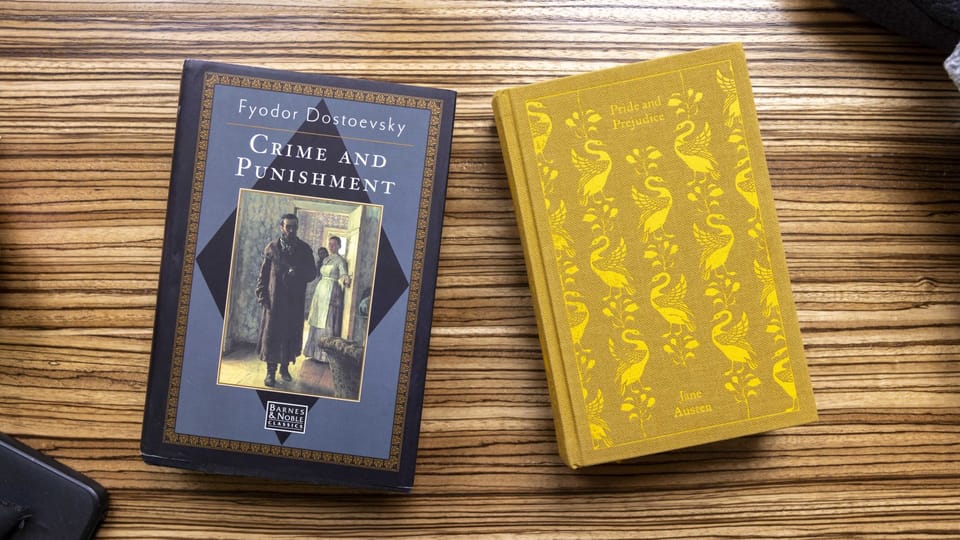Humans universally respond to high stakes

Two books I never thought would go together
Recently I read Pride and Prejudice and the first book that I thought of when I finished it was Crime and Punishment. On the surface these books couldn’t be more different but there is one very specific theme that struck me: the development of each main character when the consequences of their poor behavior really sets in.
I read this Pride and Prejudice because my finance Miss Kate has a masters in English literature with a focus on Jane Austen that she received while attending Oxford. I had never read Jane Austen and it seemed appropriate and long overdue that I consume some. I have read Crime and Punishment twice because I have a weird and unexpected sort of obsession with 1800’s Russian philosophy.
I’ll give a brief synopsis of each book for those who might not have read them.
Pride and Prejudice is about a young woman named Elizabeth, one of 5 sisters who’s sole aim in life is to get married. She meets a guy named Mr. Darcy who is great on paper but he’s standoffish and a little rude. She immediately condemns his poor behaviors and condemns his entire personality with little room for forgiveness. This is her pride, and prejudice.
Crime and Punishment is a much different story. It follows a young man named Raskolnikov who plots against an evil pawnbroker. He rationalizes that the world would be better without her and that he would be a better use of her money than she would, so he goes to her house and ax murders her and her daughter.
I would like to take the brave opinion that murder is far worse than the social condemnation of a possible suitor. My analysis could have ended here and nothing would come from connecting these two books…but my brain doesn’t really do that.
What attracted me to this dissection was that both books have a very unique instance where the main characters change in the same way. Both individuals are shown to be naively optimistic that they know their way is best, and they act on this belief. Again, murder is worse than Pride, but Pride is still condemned as both a 7 deadly sins and in the bible itself, proverbs 8:13 “To fear the LORD is to hate evil; I hate pride and arrogance, evil behavior and perverse speech.”
My point is not actually to equate the two behaviors. What is similar is how both characters change and react when the world rejects their actions.
Raskolnikov goes through a dramatic change in personality after he commits the murder, he is forever changed and is unable to go back to his previous way of life. It’s difficult to explain here exactly how he changes, because it’s written into his character rather than result of his actions. That’s the beauty of the book.
Lizzy goes through a similar transformation. Mr. Darcy proposes to her about halfway through the book which she rejects quite rudely, in response to this he writes her a letter defending himself and expressing all her flaws back to her – flaws she never noticed before this instance but does recognize as true.
After the letter Lizzy is also changed. She matures, she talks less and notices more, her character is written in a completely different manner. This was so distinct to me that I until this moment I thought of this book as a fairly boring account of an unremarkable woman, but after the letter she acts in such a fascinating way as to avoid further acting with the same error.
Low stakes = low care
What I love most about these stories are the shared human universality of stakes. Both of these stories were written in the 1800s with zero connection to each other and no overlap in purpose, but the characters both coincidentally respond in the same way. This signifies that humans will respond to this phenomenon in the same way regardless of time period or culture.
When the stakes are low humans will be frivolous, arrogant, and short sighted. This is the plight of many Americans in our current era as many people are well fed, well entertained, financially stable, and safe. We live with no risk and the result is that we don’t take our lives very seriously. We doom scroll, we argue about politics and culture from the safety of our couch, we are out of shape, weak bodied and weak minded, we are drug addicted and out of shape.
The unfortunate fix for this type of behavior is to increase the stakes. What sort of war, famine, economic collapse, or other tragic event would have to occur to snap our culture out of the blissful ignorance we currently share with Lizzy and Raskolnikov? The unfortunate thing about stakes is that no, myself included, wants to rush towards a life of tragedy no matter how positive the benefit might be. Every parent I’ve ever known has said “I want my kids to have a life better than the one I had” – but to what end? No one wants to make their kids weak willed and lazy either, so where is the balance?
Manufactured difficulty
The main characters of these stories snapped out of their mindless slumber when the consequences of their actions came crashing down upon them.
All of us are guilty of casually walking towards these repercussions, I’m certainly guilty, but what if we could manufacture some stakes and make our life a little more difficult on purpose to avoid doing it by accident. The idea being that controlled chaos on our terms is better than an unexpected upheaval, that willful sacrifice now is easier to adjust than forced scarcity later.
…r maybe I’m just stretching to find meaning in these two books that have nothing to do with each other. What do you think?
